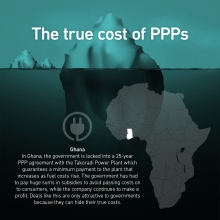Trade Unions and campaigners around the world boycott World Bank consultation on Public Private Partnerships (PPPs)

Trade unions and campaigners from around the world are boycotting the latest World Bank consultation on PPPs, due to close on 28 February.
Research shows that Public Private Partnerships (PPPs – agreements with the private sector to provide infrastructure and services normally delivered by the state – are risky and expensive and contain numerous hidden costs. Currently, most governments leave information about future debts, or contingent liabilities, out of their accounting books, making PPPs look cheaper and more efficient that traditional public procurement.
Trade Unions and NGOs the world over have launched the boycott after their concerns about these hidden costs have been repeatedly ignored by the World Bank – one of the biggest institutions promoting, arranging and funding PPPs in some of the poorest countries in the world. The organisations supporting the boycott said that they will no longer participate in public consultations until the World Bank explicitly calls on countries to only consider PPPs if their full costs and contingent liabilities are reported on-balance sheet and registered as government debt. The expected costs and impacts of PPPs should also be examined in advance, and compared to other methods of delivering the public service.
“Public services are massive pools of potential corporate profit, and PPPs serve to access them. The ‘clients’ are captive, the services are often monopoly,” comments David Boys, Deputy General Secretary of PSI. “Research has shown that PPPs have failed to live up to their promise. In most cases, they are an expensive and inefficient way of financing infrastructure and services, since they conceal public borrowing, while providing long-term state guarantees for profits to private companies.
Maria Jose Romero, Policy and Advocacy Manager at the European Network on Debt and Development (Eurodad) said: “We are not against the private sector having a role in development projects. What we are against is expensive and risky projects that are devised behind closed doors away from public scrutiny and which leave the public sector with the majority of the financial risk. This is what PPPs too often are.
“We want to see all costs published in government balance sheets, including future debt, and we want full transparency for negotiation and renegotiation of contracts. Without this, the private sector will reap all of the benefits and the public will be the ones that suffer when costs escalate and governments have to foot the bill.”
More than 75 trade unions, including many PSI affiliates, and NGOs from four continents have signed a letter to the World Bank explaining their reasons for the boycott and calling again for change.
Background information:
The current consultation that is boycotted by Trade Unions and campaigners is in relation to contractural provisions in PPPs: https://consultations.worldbank.org/consultation/recommended-public-private-partnership-ppp-contractual-provisions
PPPs that have led to crippling debts for developing country governments include:
Lesotho: “According to an Oxfam study, the Queen Mamohato Memorial hospital in Lesotho, financed and supported by the World Bank, shows how problematic a PPP project can be. This project locks the government in until 2027 and swallows up more than half of the country’s health budget, while giving a high return of 25% to the private sector provider. This has diverted much needed public funds from hospitals in rural areas, where three quarters of the population live.” See: https://www.oxfam.org/en/research/dangerous-diversion
More information:
- See the Joint letter
- EURODAD Press Release
- World Bank: Recommended PPP Contractual Provisions for public consultation.
- Sign up for PSI’s Privatization Watch Newsletter: in English, Français or Español.
- Read PSI’s research on why PPPs don’t work
- See PSI’s Privatisation pages

